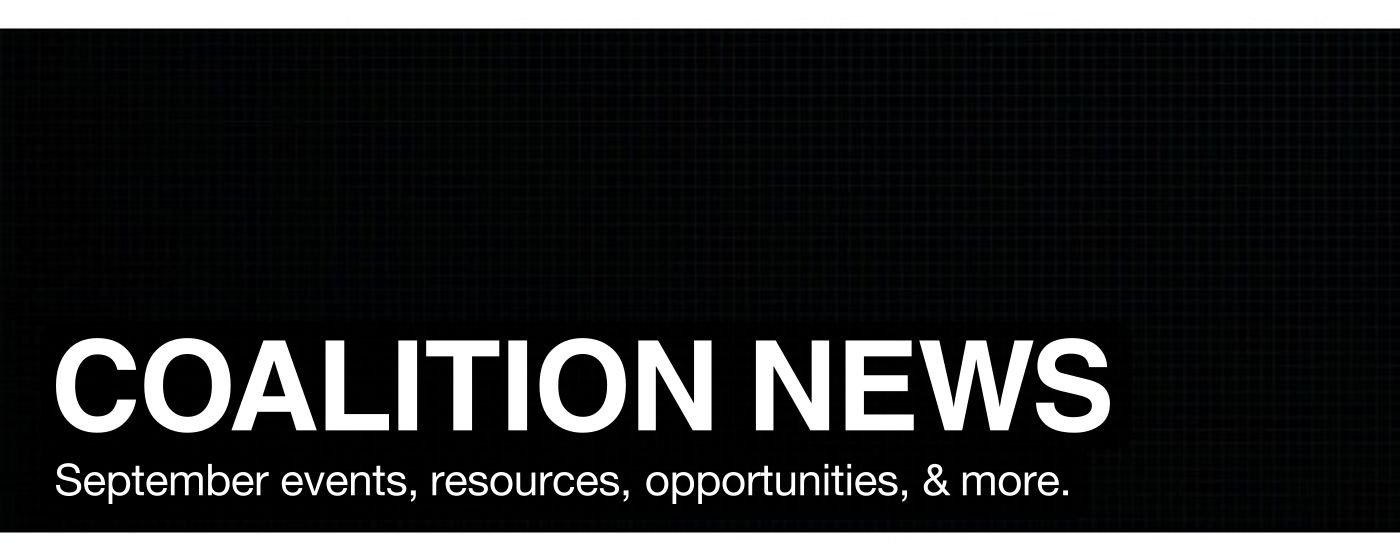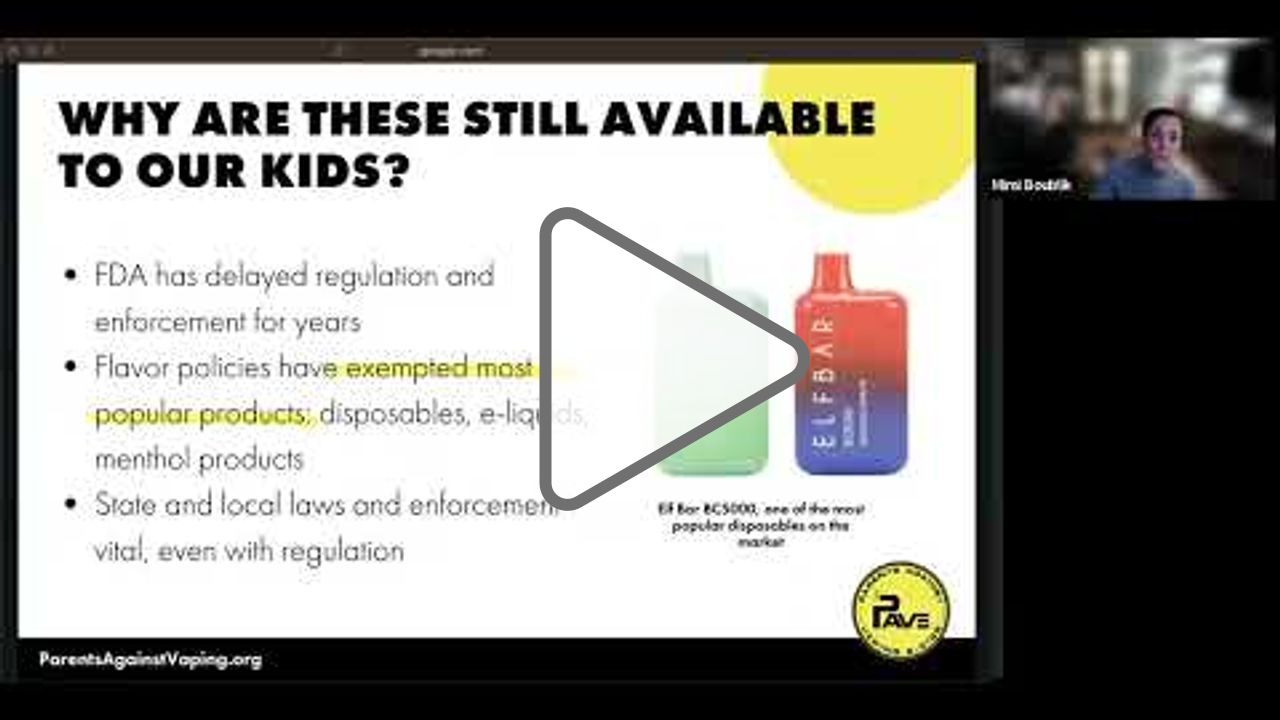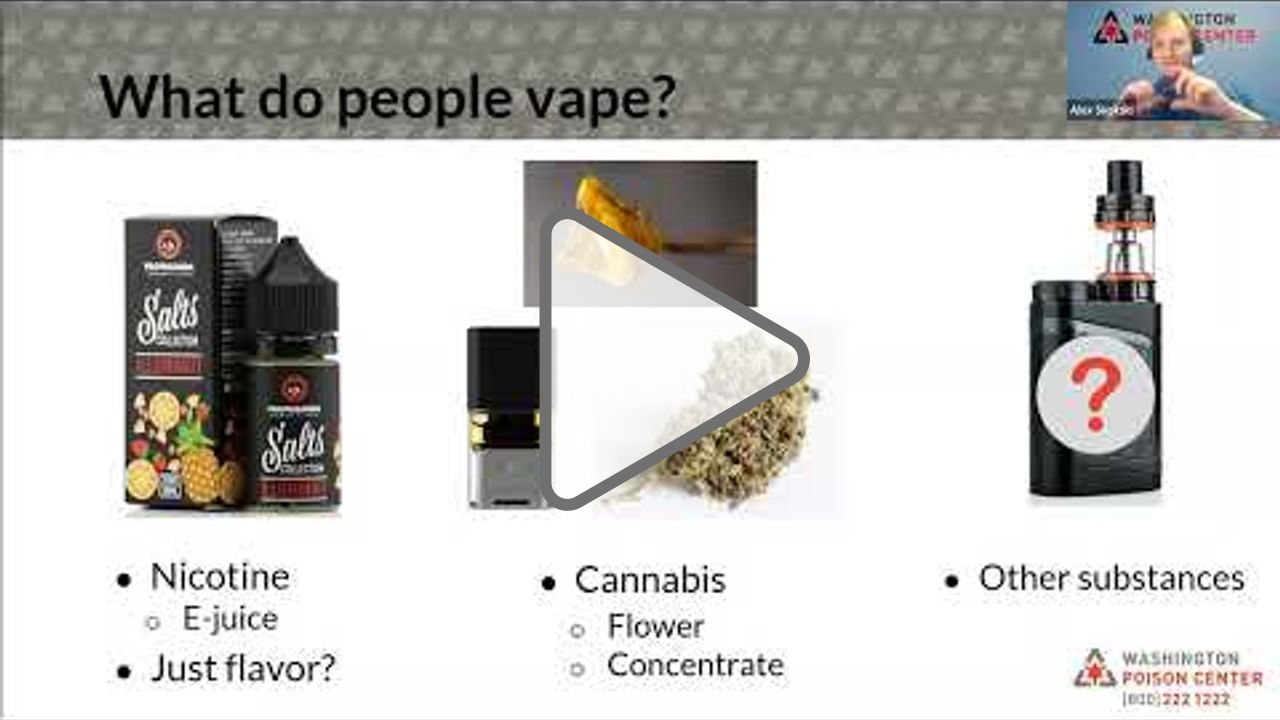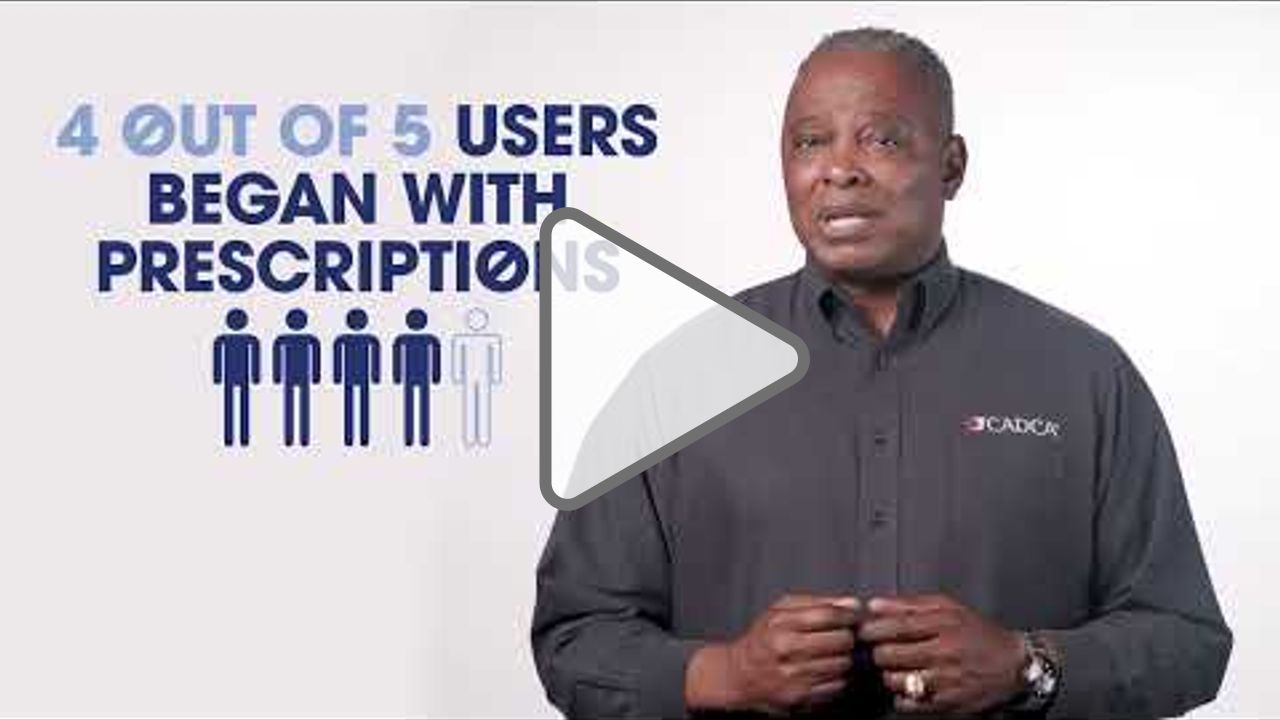|
COALITION NEWS
September events, resources, opportunities, & more.
|
| |
 |
|
 |
|
The 2024 National Youth Tobacco Survey (NYTS) released Sept. 5, 2024 by the U.S. Food and Drug Administration (FDA) and the U.S. Centers for Disease Control and Prevention (CDC), shows significant progress in reducing youth e-cigarette use, with nearly half a million fewer middle and high school students currently vaping.
Key numbers: - E-cigarette use among high school students fell to 7.8%, down from 10% in 2023 and a high of 27.5% in 2019.
- The number of middle and high school students who reported current e-cigarette use fell to 1.63 million, down from 2.13 million in 2023.
Click here to read the full news release from the Center for Tobacco Products (CTP).
|
|
 |
|
 |
|
News Release from Clark Co. WA Communications
Posted on FlashAlert: August 27th, 2024
Millions of vaping devices and cartridges are sold in the US each month, and a growing number of vapes are designed to be disposable, single-use devices. In one month, more than 13 million disposable devices are sold in the US. With the rise in popularity of disposable vapes comes a rise in electronic and hazardous wastes.
Vaping devices often contain batteries and hazardous substances that should never be thrown in garbage or recycling carts. Batteries disposed of in household garbage or recycling carts can ignite, posing significant fire risks during transportation and at transfer stations. And the liquid nicotine in vapes is highly toxic and can cause serious harm if ingested or absorbed through the skin.
Clark County Public Health’s Solid Waste Education and Outreach team is committed to ensuring the proper disposal of nicotine vapes and offers the following guidance for Clark County residents to dispose of the devices, batteries and cartridges for free:
|
Whole device, including cartridges (with or without liquid) and batteries Device battery Empty liquid cartridges, tanks, bottles or vials - Garbage only. Do not put these items in recycling carts.
Device without battery
|
Vape devices collected for disposal by businesses, schools, government agencies and nonprofit organizations must be managed as business dangerous waste and are not accepted at the residential drop-off locations listed above. Learn more about business dangerous waste on the Clark County Public Health website.
Vape devices containing cannabis can only be disposed by sites authorized to handle controlled substances, such as pharmacies and police departments, and are not accepted at residential drop-off locations.
For more information about disposal options for vapes and other battery-containing items, download the RecycleRight app or go to www.recyclingdoneright.com.
Nicotine is highly addictive and has known negative health effects. For help quitting vaping, call the Washington State Quitline at 1.800.QUIT.NOW or visit www.quitline.com, or download the 2Morrow Health app.
|
|
On Aug. 29, FDA announced a final rule that raises the minimum age for certain restrictions on tobacco product sales. These requirements are in line with legislation signed in December 2019 that immediately raised the federal minimum age of sale of tobacco products in the United States from 18 to 21 years of age. Once implemented, the requirements are expected to help decrease underage tobacco sales.
Beginning Sept. 30, retailers must verify with photo identification the age of anyone under the age of 30 who is trying to purchase tobacco products, including e-cigarettes. Additionally, starting Sept. 30, retailers may not sell tobacco products via vending machine in facilities where individuals under 21 are present or permitted to enter at any time.
Click here to read the FDA news release.
|
|
All of our podcast episodes can be enjoyed at preventcoalition.podbean.com or on Google Podcasts, the Apple Podcast app and other familiar streaming services. Episodes are also archived at preventcoalition.org/events/news/.
Season 2 Episodes:
Season 1 Episodes:
Consider adding the Prevent Coalition Podcast to your playlist! We're sharing stories and strategies to help coalitions and organizations reach their full potential.
|
 |
|
The CUNY Graduate School of Public Health & Health Policy is recruiting young adults in WA State to participate in a national study looking at alcohol delivery through online food delivery services.
Participants must be: - Between the ages of 21-26,
- Live in an area where alcohol delivery is allowed,
- Live in Washington State and have access to a smart phone,
- Must apply by 9-30-24!
|
Incentives will be offered by the research funder upon successful completion of program.
Please share the flyer with this story or the QR code with young adults in your community or programs. Please do not share the flyer or QR code on social media to help the CUNY Graduate School and Washington LCB prevent bot/spam related traffic. Questions about the opportunity can be emailed to [email protected].
|
|
 |
|
Through generous grant funding from the Muckleshoot Indian Tribe, the American Lung Association is excited to offer full scholarships for the Not on Tobacco (N-O-T) facilitator trainings in the state of Washington. The trainings are held online (virtual) and valued at $400!
The Not on Tobacco® (N-O-T) program seeks to address the youth vaping crisis by giving teens 14-19 years old the resources they need to break their nicotine dependency and find healthier alternatives. N-O-T is an evidence-based program with an impressive success rate, where approximately 90 percent of teens who have participated in the program, either cut back, or quit tobacco all together.
Application process:
- DOWNLOAD THE APPLICATION HERE and carefully complete.
- Submit the completed application via email: [email protected]
- Deadline for submission:
- September 30th for October training start date, or
- October 31st for November training start date.
- Applicants will receive notification within one week of application submission.
- Successful applicants will receive details on how to access the training approximately 2 weeks after each application deadline.
- A wait list may be used.
Who may apply: Schools, community organizations, and individuals across Washington that are interested in providing tobacco and vaping cessation services to teens via the Not on Tobacco program. Applications must identify an individual to be trained and certified as a NOT facilitator.
For more information about the program visit the N-O-T program webpage at www.lung.org. If you have questions about the N-O-T program facilitator training scholarship please reach out to Alyssa Bloom-Keill, American Lung Association ([email protected]).
|
 |
|
|
Resources to Support a Safe School Year
Schools are back in session with the excitement of a new school year. Youth serving adults and parents can help students safely navigate through this school year by boosting their knowledge about the risks of vaping, educating youth, and promoting alternatives to use. Below is a mini tool kit of resources to assist!
|
|
|
 |
|
|
|
 |
This recorded webinar presented by the Washington Poison Center in 2022 will provide essential information about vaping devices, health concerns, youth vaping trends and risks. Best suited for prevention professionals, parents, educators, community coalitions and members. Hosted by ESD 112 and Prevent Coalition of Southwest Washington.
|
|
|

|
Stanford Tobacco Prevention Toolikit
|
Free curriculum includes a middle and high school program with 6 lessons, approximately 50 minutes each. A two-lesson elementary school version, approximately 50 minutes each, is available. Every lesson provides activities, online quiz games, and worksheets in addition to presentations, resources, and other materials aimed at addressing key factors associated with youth e-cigarette use.
|

|
Vaping: Know the Truth
|
This self-led interactive digital curriculum is for grade levels 8-12, can be completed in approximately 30-60 minutes, and aligns to national health education standards. In addition to encouraging students to live vape-free lives it offers resources to help young people who are currently using e-cigarettes to quit.
|

|
Catch My Breath Youth Vaping Prevention Program
|
This peer-led teaching approach empowers students with the knowledge and skills needed to make informed decisions about e-cigarettes and resist social pressures to vape. Free access includes English & Spanish versions of the core curriculum for grades 5-12.
|
|

|
FDA Vaping Prevention & Education Resource Center
|
Access free resources for teachers, students, and parents to learn more about the dangers of vaping nicotine. Includes lesson plans, videos featuring real teens, science-based information, and more.
|

|
Stanford Medicine Cannabis Awareness Toolkit
|
Theory-based and evidence-informed resources created by educators, parents, and researchers aimed at preventing middle and high school students’ use of cannabis/marijuana.
|

|
Classroom Resources - National Institute on Drug Abuse
|
Search curriculum on the science and consequences of substance use. All lessons are based on national science and education standards and were developed by scientists from leading universities and the National Institute on Drug Abuse. Also available are conversation starters for parents and "Ask a Scientist" videos.
|
|
|

|
Choose You Campaign
|
Washington State Department of Health (DOH) launched this campaign to promote heathy youth choices and educate youth about the risks of using vapes. Links to quitting resources available.
|

|
Empower Vape Free Youth
|
The Empower Vape-Free Youth campaign encourages middle and high school educators to speak with students about the risks of e-cigarettes and nicotine addiction. The campaign includes resources for educators to help students avoid or quit vaping.
|

|
Find Your Good Campaign
|
The Find Your Good campaign aims to promote healthy activities and positive interactions between youth, to help them recognize there are ways to cope with stress without using drugs or alcohol. Campaign materials and more information available at youthnow.me/findyourgood
|
|
 |
|
Suicide prevention month provides an opportunity to create awareness, implement suicide prevention in social networks and communities, and help those in need. Helpful resources are listed below (click link to visit resource website):
|
|
The National Suicide Prevention Lifeline, known as 988, is a resource where compassionate, accessible care and support is available for anyone experiencing mental health-related distress - including youth - whether that is thoughts of suicide, mental health or substance use crisis, or any other kind of emotional distress. People can also contact 988 if they are worried about a loved one who may need crisis support.
The Substance Abuse and Mental Health Services Administration (SAMHSA) frequently updates their 988 Resources. They provide a 988 Partner Tool Kit with a variety of messaging, social media images and chat shareables, print materials in a number of languages, plus 988 branded stickers, magnets, and posters to help you promote 988 in your community.
|
988 - Lifeline Services for Certain Populations
Did you know the 988 Lifeline provides specialized services to certain populations? - American Sign Language (ASL) services: Individuals who use ASL as their primary language can call 988 via videophone to receive support from a counselor in ASL. TTY users can use their preferred relay service or dial 711, then 988.
- LGBTQI+ youth subnetwork line: LGBTQIA2S+ teens and young adults, ages 13-24, can call, text, or chat the 988 Lifeline to receive support from affirming crisis counselors.
- Native and Strong Lifeline: Washington American Indian and Alaska Native people can call, text, or chat the 988 Lifeline to receive support from native crisis counselors who are tribal members and descendants closely tied to their communities. Native and Strong Lifeline counselors are fully trained in crisis intervention and support, with special emphasis on cultural and traditional practices related to healing.
- Spanish language line: To receive support in Spanish, call, text, or chat the 988 Lifeline and choose option 2.
- Veterans Crisis Line: Veterans in crisis or anyone concerned about a veteran in crisis, can call 988 and press 1 to be connected to the Veterans Crisis Line. You can also chat online or text 838255. Veterans Affairs benefits or health care are not required.
The Lifeline offers interpretation services in more than 240 languages and dialects. These services are available 24/7/365. To receive support in languages other than English or Spanish, call the 988 Lifeline and say the name of the language you need.
Check out what's new at SAMHSA's 988 information website, www.samhsa.gov/find-help/988 or visit the Washington Department of Health's 988 Suicide & Crisis Lifeline page and learn more about specific services in Washington State.
|
|
 |
Everyone deserves to be safe and know how to keep the people they care about safe too. Friends for Life is a campaign to inform and educate people about:
- what illicit fentanyl is and why it is unpredictable.
- how to help teens avoid opioids like fentanyl.
- how to spot and respond to an opioid overdose.
- how to access and use naloxone (Narcan) in an emergency.
The campaign is funded by the Washington State Health Care Authority (HCA). A campaign website is available with toolkits for parents, caregivers, harm reduction partners, and prevention partners. The toolkits contain materials for class presentations, conversation guides, posters, social media graphics, and more.
Visit wafriendsforlife.com to access the toolkits and resources.
|
|
Xylazine, also known as "tranq," is increasingly being found in the illicit drug supply, often in combination with opioids like fentanyl. The U.S. Drug Enforcement Agency (DEA) has seized xylazine and fentanyl mixtures in 48 out of 50 states.
Xylazine is not an opioid, and naloxone (Narcan) does NOT reverse its effects. Still, experts always recommend administering naloxone if someone might be suffering a drug poisoning. Test strips that can detect Xylazine are available to help with harm reduction.
Clark County (Washington) Public Health Department created an informative one-page flyer about this dangerous drug (click on image with this article to view flyer).
|
|
 |
CADCA launched a new campaign to reduce overdoses called "Over the Dose?" The campaign seeks to prevent the opportunity for misuse before it starts. Too often patients are prescribed more prescription medication than they need. Since many are unaware of how to store or dispose of dangerous pills, they can fall into the wrong hands.
From August - October join CADCA in challenging your communities to safely dispose of unwanted medications. Resources such as videos, social media graphics, messaging, drop box locations, and more are available on the campaign website.
Visit cadca.org/over-the-dose to learn more and download resources to promote the campaign.
|
|
With the right treatment, support, and resources, recovery is possible for everyone. SAMHSA created a toolkit for National Recovery Month (September) with information to help support people in recovery and resources that can be shared with your audiences.
The tool kit provides: - Social media content to help spread awareness about the process of recovery and to share hopeful message that most people who get help do recover.
- Resources for learning about and supporting those in recovery.
- Promotional materials.
All materials are designed to be shared with your audiences and across your media channels; they are downloadable and shareable, and some of the material is customizable. To access the tool kit and get more information about implementation please visit samhsa.gov/recovery-month/toolkit.
|
|
 |
|
|
|
The CDC Division of Adolescent and School Health (DASH) created this tool kit to help schools and communities support students and empower families to prepare for a healthy and successful school year.
The sample social media posts and graphics help promote messages about mental health, connectedness, family involvement, wellness, healthy habits, physical activity, school preparedness, and general tips for the school year.
Click here to view the resources at cdc.gov/healthyyouth/back-to-school.
|
|
As students head back to school, e-cigarette companies are targeting them with products that are more kid-friendly and addictive than ever. Today’s devices come in thousands of fruity flavors, deliver massive doses of nicotine and can even include built-in video games – and nearly all are illegal!
Campaign for Tobacco Free Kids developed a new back-to-school webpage with information and social media resources to raise awareness in your community. Click here to view the resources.
|
|
October will be here soon so now is a good time to start planning your event for Red Ribbon Week!
The Red Ribbon campaign serves as a catalyst to mobilize communities, educate youth and encourage participation in drug prevention activities. Ways to show support range from wearing red to facilitating events and activities that bring awareness to living a drug-free life.
The Drug Enforcement Agency (DEA) provides a toolkit to help with planning which includes promotion ideas for communities and schools, sample press release and talking points, and social media graphics. Boy Scouts and Girl Scouts who participate can earn a patch through the DEA scouting patch program.
Learn more by viewing the resources at www.dea.gov/redribbon.
|
|
The Washington State Legislature wrapped up the 2024 session on March 7th. However, anytime is a good time to better understand the legislative process. Grant County Health District developed a toolkit just for that purpose with support and endorsement from the Youth Cannabis and Commercial Tobacco Prevention Program (YCCTPP).
This toolkit is meant to serve as an educational resource and includes a compilation of knowledge, definitions, experiences, and guidance from several well-known players on the WA State prevention scene.
Click here (or the image) to view the toolkit.
|
 |
*Storing medicine in a locked location is the single most effective deterrent to accidental poisonings, overdose, medicine theft, and misuse that can lead to prescription drug addiction. Stay informed and talk with loved ones about the risks for ingesting or taking medicine not prescribed for them and benefits of safeguarding your medications. Learn more at www.LocksSaveLives.org.
|
 |
|
Provided by the Rural Health Information Hub (RHIhub), the toolkit compiles evidence-based and promising models and resources to support organizations implementing suicide prevention programs in rural communities across the United States. There are seven toolkit modules with resources and information focused on developing, implementing, evaluating, and sustaining rural suicide prevention programs.
Click here to access the toolkit resources.
|
|
Cultivate, elevate, and celebrate rural voices! The 2024 Rural Conference will take place on September 25 & 26, 2024 at the Yakima Convention Center, Yakima, WA. This will be the second Rural Conference and excitement is growing! Registration and agenda are available on the conference web page, please visit preventcoalition.org/ruralconference.
Scholarships are available! If you are interested in attending but lack funding or have questions about the conference or the Rural Network, please feel free to contact us at [email protected].
|
|
Whether you have recently joined the Rural Network or are still thinking about it there is a resource available that will answer your commonly asked questions - our New Member Orientation Guide!
This guide describes our mission, vision, funding, 7 core principles, who we serve, and how to get involved. It also describes what our meetings are like and why you should join!
Learn all the details at smore.com/8eqhp
|
|
|
|
|
|
Monthly “Rural Network Meetings”
The full membership meets monthly on the last Tuesday from 2-3:30pm. This meeting is meant to engage network members, build connections across isolated communities, provide training to members and bring in guest speakers, we do policy work and have guest legislators come to meet rural volunteers, and we also do community-of-practice style activities where members share their experiences with one another or tackle tough issues collaboratively. These meetings are usually held virtually and open to the public, anyone is welcome to join.
|
Conference Workgroup
This group meets monthly to prepare, design and plan for a statewide gathering of rural prevention professionals which happens every 2 years in Yakima, called the Rural Conference. We had our first ever conference last year convening our network members and the goal is to expand on that experience and make it even bigger and better than it already was. This committee gets to design theme, branding elements, activities that happen at the conference, agenda, speakers and more. This workgroup is hosted by the Rede Group, an event-planning subcontractor of Rural Network. The committee meets on a rotating schedule based on volunteer availability each month.
|
Book Club
|
Engagement Committee
This is our newest Committee. It is tasked with reflecting and brainstorming about member engagement. The committee will discuss recruiting for opportunities, barriers to Rural Network participation, strategies and activities to build capacity and membership across rural communities, as well as feedback received about participation. The Engagement Committee meets the second Wednesday of each month from 10am-11am.
We are looking for more members! If you are interested in participating, please reach out to Abigail Wells at [email protected].
|
Steering Committee
Our leadership team guides the work of the Rural Network, reflects on action plan progress, plans monthly meeting agenda, and evaluates the progress and outcomes of the program. We’re looking for more members to guide the work and get involved to increase our Steering capacity and keep the work sustained/strong. We meet monthly on the 1st Thursday from 10am-11:30am (PT) and are hoping to add 3-4 more members.
|
Toolkit Workgroup
We have a Toolkit Workgroup meeting that is currently on pause due to funding delays and contract negotiations. This committee will eventually be run by the Montana Institute and is in charge of creating a Positive Community Norms (PCN) Campaign for rural communities statewide. Last year, this committee updated the Find Your Good campaign and created new messaging/media based on a rural youth survey they created and promoted.
|
Office Hours
Our staff holds a placeholder for an hour every month for people to come and brainstorm, bounce ideas off one another, or otherwise receive support or Technical Assistance from any/all our staff team. Sometimes you need a like-minded Coordinator to generate ideas, double check their action plan, troubleshoot a difficult sector representative, etc. We’re here to support you at these monthly time slots. Email Abigail Wells ([email protected]) or [email protected] to reserve this time with us.
|
 |
 |
7 Core Principles Rural Network.pdf
|
|
Download
1.1 MB
|
|
 |
|
Rural Network Meeting
Tuesday, October 1, 2024 2-3:30 p.m. Virtual Meeting For Rural Network Members. September meeting reschedule due to overlap with Rural Conference.
Rural Network Office Hours
Wednesday, October 2, 2024 1-2 p.m. Virtual Meeting For Rural Network members to receive technical assistance
Rural Network Steering Committee
Thursday, October 3, 2024 10:00-11:30 a.m. Virtual Meeting Develop the plan, guide the implementation, evaluate the results.
Rural Network Meeting
Tuesday, October 22, 2024 2-3:30 p.m. Online conference call Regular monthly meeting for Rural Network Members.
All times are Pacific Standard Time (PST)
|
|
Relevant events and training not sponsored by Prevent Coalition:
PTTC
2024 Northwest Prevention Leadership Academy
Virtual Sessions - 1pm-2:30pm (PT) on July 24, September 3 and 24 In-person, Tacoma, WA September 11-12, 2024
Cost: Free! Registration: Click here to learn more on PTTC website.
Participants must attend all virtual and in-person sessions to receive 20-hour certificate of participation. The academy will explore leadership principles for prevention coalitions using a set of Liberating Structures; practical methods and tools designed to foster active participation and create innovation among team members, collaborators, and communities.
ADAI Symposium 2024
Cannabis, Schizophrenia, and Other Psychotic Disorders
Virtual and In-person, University Tower, 4333 Brooklyn Ave NE, Seattle, WA September 19, 2024 Cost: Free! Registration and event information: Visit event website.
Join ADAI's Cannabis Education & Research Program this fall for their biennial symposium on the latest in cannabis research presented by local and international experts. This year's event will focus on cannabis, schizophrenia, and other psychotic disorders.
Washington State Public Health Association 2024 Annual Conference
In-person, Yakima Valley, WA October 9-11, 2024 Cost: Early bird rates, $450 member, $585 Non-member. Discounted rates available. Registration and event information: Visit event website.
Did you know that this is WSPHA's 90th anniversary?! This year they will celebrate the roots of public health in social movements and collectively consider the past to pave the way for the future. This year's theme is, "Cultivating Social Justice: Past, Present, & Future". Attendees will find an engaging lineup of plenaries, workshops, and networking opportunities.
Washington State Prevention Summit 2024 In-person, The Westin Seattle, Seattle, WA
October 30-31, 2024 Cost: Adult $200, Youth (18 and under) $100 Registration and event information: Visit event website.
The Prevention Summit is an enriching training and networking opportunity for youth, volunteers, and professionals engaged in health promotion and the prevention of substance misuse, violence, and other high-risk behaviors, in a setting that promotes cultural humility. The Summit provides high-quality workshops, forums, and hands-on learning opportunities designed to meet a variety of needs, including professional development for prevention professionals. Summit includes a separate track for youth.
CADCA
35th Annual National Leadership Forum Gaylord National Hotel & Convention Center, National Harbor, MD February 3-6, 2025 Event website coming soon! Click here for past event information. CADCA Forum provides training from top experts in the field, Information, tools and strategies to take your prevention work to the next level, the latest science, news and trends on substance misuse issues, the opportunity to network with thousands of advocates passionate about prevention, and specialized youth leadership training. You may also consider attending SAMHSA's 21st Annual Prevention Day that will be held on February 3, 2025.
National Conference on Tobacco or Health 2025 In-person, Chicago, IL
August 26-29, 2025 Registration and event information TBD More Information on the National Network of Public Health Institutes website.
The National Conference on Tobacco or Health (NCTOH) is one of the largest, long-standing gatherings for top United States tobacco control professionals. The convening attracts a diversity of public health professionals committed to best practices and policies to reduce tobacco use—the leading preventable cause of disease and death in the United States.
NW PTTC
Ethics in Prevention Foundations (Virtually moderated 6-hour course) Repeats monthly, visit website for next session! No Fee, Limited Space Available This two-week, asynchronous moderated course, adapted from the original SAMHSA Center for Application of Prevention Technologies (CAPT) course, explores the six principles of the Prevention Code of Ethics. The course also introduces a decision-making process to help practitioners apply this code to a variety of ethical dilemmas, and an online discussion area to facilitate discussion with other course participants. Course meets requirements for prevention specialist credentialing.
View ongoing training and events at https://pttcnetwork.org.
NW PTTC Special Topics in Prevention of Substance Misuse (Self-paced courses) A large selection of online, on-demand courses that explore special topics in prevention of substance misuse that will better-equip prevention professionals & coalitions to serve their communities. Access the courses via the HealtheKnowledge.org website.
NW PTTC Pharmacology for Prevention Professionals (Self-paced course) Explore the basics of how substances impact major brain regions and the acute and chronic symptoms associated with different substances. Certificates of 1.5 hours for each of the following four courses: Basics of Pharmacology and Alcohol, Basics of Pharmacology and Opioids, Basics of Pharmacology and Psychostimulants (Cocaine & Methamphetamine), and Basics of Pharmacology and Cannabis. Learn more and enroll via the HealtheKnowledge.org website.
CADCA Training and Events Website Free! Explore the library of webinars available, both archived and coming soon. Hosted by CADCA trainers covering topics related to starting and operating a community coalition, prevention, and more. Visit the CADCA TRAINING & EVENTS website.
CADCA Webinar Wednesday Series Free! Register for an upcoming Wednesday webinar or view archived recordings on your own schedule. Visit the CADCA WEBINAR WEDNESDAY SERIES website.
|
 |
Connection is the Best Prevention
Supported by fiscal agent ESD 112, Prevent Coalition is a regional coalition formed in 2003 to increase collaboration, awareness, and reduce youth substance use in Southwest Washington. Prevent Coalition also implements initiatives for rural communities across Washington state. As a community mobilizer, our coalition creates a culture promoting healthy choices; advocates for policies and regulations that protect, empower and nurture youth; and facilitates positive opportunities for youth to be involved and thrive.
Email: [email protected]
Website: www.PreventCoalition.org
Location: 2500 NE 65th Ave., Vancouver, WA, USA
Phone: 360-952-3457
Facebook: Facebook.com/PreventCoalition
Twitter: @supportyouthnow
|
 |
Prevent Coalition
Prevent is using Smore to create beautiful newsletters |
|
|
|
|
| |

|
Unsubscribe from emails by Prevent Coalition.
|
|
|



























































































































































































